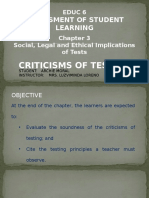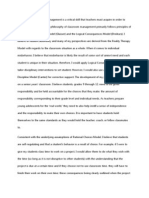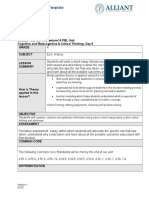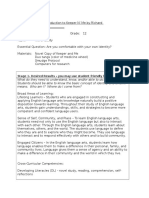A DETAILED LESSON PLAN IN PROFED 605 Hatara
A DETAILED LESSON PLAN IN PROFED 605 Hatara
Uploaded by
Sue MarquezCopyright:
Available Formats
A DETAILED LESSON PLAN IN PROFED 605 Hatara
A DETAILED LESSON PLAN IN PROFED 605 Hatara
Uploaded by
Sue MarquezOriginal Title
Copyright
Available Formats
Share this document
Did you find this document useful?
Is this content inappropriate?
Copyright:
Available Formats
A DETAILED LESSON PLAN IN PROFED 605 Hatara
A DETAILED LESSON PLAN IN PROFED 605 Hatara
Uploaded by
Sue MarquezCopyright:
Available Formats
Republic of the Philippines
SULTAN KUDARAT STATE UNIVERSITY
College of Teacher Education
ACCESS, EJC, Montilla, Tacurong City
A DETAILED LESSON PLAN IN PROFED 605
I. Objectives
At the end lesson, the students can ,
1. Explain the meaning of metacognition
2. Identify the three components of metacognition
3. Determine the novice and expert learners
4. Recall the importance of metacognition in Learning
II. Subject Matter
A. Topic: Metacognitive
B. Material:Laptop, Pictures, Print materials, Projector
C. Reference: https://cambridge-community.org.uk/professional-
development/gswmeta/index.html
D. Value: understanding the purpose of Metacognition in fostering
learning.
III. Procedures
Teacher's Activity Student's Activity
A.Preliminary Activities
(Greetings)
“Good morning Class!” “Good Morning Ma’am!”
(Prayer)
“Let us pray first…” (one student will lead the prayer)
(checking of attendance) (students will tell who’s absent for today)
A. Priming Activating Knowledge
Learning Task 1 - Review
“Last time we discussed about?" “4 Stages of Piaget's Cognitive
Development"
"So what are the 4 stages of Piaget's
cognitive development?" "The four stages of Piaget's Cognitive
Development are Sensorimotor,
preoperational, Concrete Operational and
"That's right" Formal Operational"
"Is there any question about our past
lesson?" "None ma'am"
“Since you understand our last lesson ,
now we will begin with the group activity”
Learning Task 2 – Motivation
“I will group you into 2 groups”
“This row is the group 1, and this row
is the group 2, Understand?”
“Yes ma’am!”
“You will have a chance to play Tic Tac
Toe
with your group. You can play as many
games as possible within the 2-minute
time limit. You should
pay attention to what’s going on in your
minds as you make your choices
throughout the game.” "Yes ma'am"
“Understand?”
(Game start)
“okey times up”
“Okey everyone enjoyed the game,
Group 2 won”
“So,What were you thinking in your
minds before ou made your moves? Do “We like to start in the corner because we
you can win in that way”
have a favorite place to start? Why do
you start there?
: “Right ! You have a plan, and that helps
you win!
B. Lesson Proper
Learning Task 3 – Activity
"Now class lets have a world
puzzle. I will give each group an "Yes it is"
envelope"
"With the same group, each
group will have 2 words to
form"
"I will give you 3 minutes to do
that"
"Is it clear?"
Group 1 "Metacognition is the process of thinking
METACOGNITION about one's own thinking and learnings."
NOVICE LEARNER
Group 2 "Expert Learner!"
"Novice Learner"
EXPERT LEARNER
METACOGNITIVE KNOWLEDGE "Yes ma'am"
Learning Task 4 – Analysis
"So for u what is "Yes ma'am"
metacognition?" "Metacognition is the process of thinking
about one's own thinking and learnings."
"Very good"
"So what do you think are you
an expert learner or novice
learner"
"Novice and Expert learners"
"Okey ! We will see in our new
lesson what kind of learners are
you ."
Learning Task 5 – Abstraction
(Teacher will present the
lesson)
"Ms. Galagar kindly read the meaning "Have knowledge in different subject
of metacognition" area'
" They are good in problem solving"
"Thankyou Ms. Galagar"
"Yes! Metacognition involves
knowing when you know,
knowing when you don't know.
In other words, it involves self "Metacognitive Knowledge"
monitoring and correcting your
own learning process" "Metacognitive Regulation"
"So we have two different kind "Metacognitve Experience"
of learners , what are they?"
"Very good! Novice learner and Expert
learners."
"Novice learners are well-intentioned
folks who are typically brimming with
enthusiasm while lacking actual
knowledge abour the subjrct being
taught"
"What is Expert Learner?"
"Very good!Expert learners employ "Yes ma'am"
metacognitivr strategies in learning. They "None ma'am"
are more aware of their learning process
as they read, study and do problem
solving"
"Metacognition has 3 components give "
me the one component Ms. Planto" okey ma’am”
"Very good! How about the second
component, Mr. Puedan?" (writing descriptions about whats
"Correct ! And the last one, Mr. happening in the video)
Florentino?"
"Very good ! So those are the 3 “ Yes ma’am!”
components of metacognition"
"Metacognitive Knowledge refers “Ma’am”
to the awareness individual possess
about themselves and other people as (reading )
cognitive processor."
"Metacognitive Regulation ,on the
other hand has to do with people's
control over cognition and learning
experiences through a set of methods
that help people regulate their learning"
"Metacognition involves knowing
" Last component is Metacognitive when you know, knowing when
you don't know. In other words, it
Expererience it involves cognitive
involves self monitoring and
efforts that are currently taking place"
correcting your own learning
"Do you now understand? process"
"Any Question?"
Learning Task 5 – Application "Expert Learner and Novice Learner"
“Im going to show to you a 3 minutes
video and you should write a description "Metacognitive Knowledge ,
on whats happening in the video?” Metacognitive Regulation , Metacognitive
(It’s a frog about his own thinking) Experience"
(playing video)
"Yes Ma'am"
“Are you all done?” "None ma'am"
“Who can read their description in class”
“Yes, you are aknowledge”
“Very Good”
Generalization
"Again class , what is
metacognition?"
"That's right"
"What are the two types of learners?"
"Give me the 3 components of
Metacognition"
"Very good class"
"Do you all understand?"
"Any question?
IV. Evaluation
“To determine, if you really learned from
our discussion, I will give a quiz, get ½
crosswise papers.”
"Write the correct answer"
1. It is the learner that have limited
knowledge in different areas.
2. It is the learner that have deeper
knowledge in different subject area
because they look for the
interrelationships in the things they learn.
3.Refers to the awareness individual
possess about themselves and other
people as cognitive processor.
4.It involves cognitive efforts that are currently
taking place.
5.Involves knowing when you
know, knowing when you don't
know. In other words, it
involves self monitoring and
correcting your own learning
process"
V. Assignment
For your assignment, identify the 10
metacognitive strategies and prepare for
an Oral Recitation next meeting.
Prepared by :Hatara Ali Bsed 3 Filipino
Submitted to : Mrs. Mary Jean Falsario
Name: Hatara M. Ali Bsed 3 Filipino
Group Chapter Assignment: Chapter 1
Lesson 1
Topic Report : Metacognition
You might also like
- Lesson Plan Form and ParagraphDocument7 pagesLesson Plan Form and ParagraphEstrellita91% (11)
- Detailed Lesson Plan in Education 7 (Facilitating Learning)Document11 pagesDetailed Lesson Plan in Education 7 (Facilitating Learning)Juana Arapan Arvesu60% (5)
- Detailed Lesson Plan in Child AdolescentDocument3 pagesDetailed Lesson Plan in Child Adolescentset netNo ratings yet
- Lesson Plan For TTL Sajulanjaminde AsisDocument7 pagesLesson Plan For TTL Sajulanjaminde AsisGhayle de AsisNo ratings yet
- SPED Accomplishment JanuaryDocument8 pagesSPED Accomplishment JanuarySonny Matias100% (3)
- Sample - Detailed - LP - Types Fo SentencesDocument12 pagesSample - Detailed - LP - Types Fo SentencesJesil Boltron Sampang LptNo ratings yet
- Digital Literacy Skills-Finding, Using, Creating Information and Understanding Digital Practices Not Confident Somewhat Confident Very ConfidentDocument3 pagesDigital Literacy Skills-Finding, Using, Creating Information and Understanding Digital Practices Not Confident Somewhat Confident Very ConfidentJana Luz Dumam-ag PabalayNo ratings yet
- SEMI-DETAILED LESSON PLAN EDUC FacilitatDocument3 pagesSEMI-DETAILED LESSON PLAN EDUC FacilitatBebot A. CabuguasNo ratings yet
- Activity3 2Document2 pagesActivity3 2Clea Marie Capacillo BatoonNo ratings yet
- NCBTSDocument5 pagesNCBTSEdilyn Paz AcolNo ratings yet
- Detailed Lesson PlanDocument7 pagesDetailed Lesson PlanNalla Jane Villaflor100% (1)
- Module-14-Bringing-The-World-Into-The-Classroom-Through-Educational-Technology (-1Document7 pagesModule-14-Bringing-The-World-Into-The-Classroom-Through-Educational-Technology (-1shielaNo ratings yet
- Detailed Lesson Plan in Module 15Document6 pagesDetailed Lesson Plan in Module 15Sheejah SilorioNo ratings yet
- Characterizing Artistically Literate Individuals: Prepared By: Atbang, Elaiza Mae Camoro, MaricrisDocument11 pagesCharacterizing Artistically Literate Individuals: Prepared By: Atbang, Elaiza Mae Camoro, MaricrisMaricris Camoro100% (1)
- STEP I: Recalling ICT-integrated Activities ExperiencedDocument10 pagesSTEP I: Recalling ICT-integrated Activities ExperiencedMaryann MendezNo ratings yet
- Semi Detailed Lesson Plan in TechnologyDocument4 pagesSemi Detailed Lesson Plan in Technologynaes.adan.ucl100% (1)
- LESSON 2 Roles of Educational Technology in LearningDocument14 pagesLESSON 2 Roles of Educational Technology in LearningJenny SamoranosNo ratings yet
- Module 1 For Competency Based Assessment 1Document25 pagesModule 1 For Competency Based Assessment 1jezreel arancesNo ratings yet
- VerbDocument7 pagesVerbHannah Jeizel LAUREANONo ratings yet
- Assignmet 2Document1 pageAssignmet 2Jessiah Jade LeyvaNo ratings yet
- MODULE 24: The Physical Learning EnvironmentDocument1 pageMODULE 24: The Physical Learning EnvironmentRoger50% (2)
- Gajultos AssessmentinLearning2 ProjectDocument4 pagesGajultos AssessmentinLearning2 ProjectRoss Ma. Success B. GajultosNo ratings yet
- Compilation of Lesson Plan (Group 4)Document37 pagesCompilation of Lesson Plan (Group 4)Rey Dimalanta Gloria100% (1)
- Chapter 5Document8 pagesChapter 5Lewis A. PearlNo ratings yet
- FT - Activity 7Document4 pagesFT - Activity 7Rica YtangNo ratings yet
- Challenges To Digital LiteracyDocument10 pagesChallenges To Digital Literacyrichelle catabayNo ratings yet
- Ricablanca - Module 3 Lesson 3Document1 pageRicablanca - Module 3 Lesson 3Danielle DiazNo ratings yet
- DLP in Reading and Literacy 1Document10 pagesDLP in Reading and Literacy 1Margie Bajo GamayaoNo ratings yet
- Detailed Lesson Plan in Educ 103Document8 pagesDetailed Lesson Plan in Educ 103James Laurence GemidaNo ratings yet
- Educ6 Chap3 Criticism of Testing at MoralDocument25 pagesEduc6 Chap3 Criticism of Testing at MoralArchie0% (1)
- Activity Sheet: The K To 12 English CurriculumDocument4 pagesActivity Sheet: The K To 12 English CurriculumVincent ArcallanaNo ratings yet
- Inductive Semi Detailed Lesson PlanDocument3 pagesInductive Semi Detailed Lesson PlanClarissa ParedesNo ratings yet
- Scie-Chapter 2 Theories, Approaches, Guiding Principles and Methods Act.Document3 pagesScie-Chapter 2 Theories, Approaches, Guiding Principles and Methods Act.Tigerswarch WarriorNo ratings yet
- CLSMGMNTPRJTDocument16 pagesCLSMGMNTPRJTapi-204906706No ratings yet
- Chapter 6 PED15 TORRENUEVADocument2 pagesChapter 6 PED15 TORRENUEVARen RenNo ratings yet
- Educ 108 SIM 1-3Document21 pagesEduc 108 SIM 1-3Joy Baste SampianoNo ratings yet
- Fs 3Document45 pagesFs 3Joy VillanuevaNo ratings yet
- Brief Lesson PlanDocument4 pagesBrief Lesson PlanMarri Ann Na100% (3)
- Erin Kyle WK 6 Metacognitive Lesson PlanDocument3 pagesErin Kyle WK 6 Metacognitive Lesson Planapi-357041840100% (1)
- Semi Detailed Lesson Plan in EnglishDocument2 pagesSemi Detailed Lesson Plan in Englishjelyn ciriaco100% (1)
- TemaDocument29 pagesTemaAcial Perez0% (1)
- 1 Semi Detailed Lesson Plan in Grade 8Document1 page1 Semi Detailed Lesson Plan in Grade 8Angelica Bautista67% (3)
- Jenneng Detailed Lesson Plan in IMDocument4 pagesJenneng Detailed Lesson Plan in IMJenNo ratings yet
- Chapter 6 Ecological LiteracyDocument15 pagesChapter 6 Ecological LiteracyThal De DiosNo ratings yet
- Semi DETAILED LESSON PLANDocument2 pagesSemi DETAILED LESSON PLANJacky CorpuzNo ratings yet
- Facilitating QuestionnaireDocument16 pagesFacilitating QuestionnaireShane Min-aNo ratings yet
- Lesson Plan in Module 1 Lesson 3 The FouDocument2 pagesLesson Plan in Module 1 Lesson 3 The Fouciantal batobatoNo ratings yet
- Lesson Plan Edukasyon Sa PagpapakataoDocument10 pagesLesson Plan Edukasyon Sa PagpapakataoMaria sofia NapuaNo ratings yet
- Learning Outcomes Source and CharacteristicsDocument33 pagesLearning Outcomes Source and CharacteristicsUkay FindsNo ratings yet
- Detailed Lesson Plan in English (Language) : I. ObjectivesDocument4 pagesDetailed Lesson Plan in English (Language) : I. ObjectivesJean ZulykaNo ratings yet
- My PortfolioDocument44 pagesMy Portfoliojordz100% (1)
- Lesson Plan in Review On Theories Related To The Learner's Development I. ObjectivesDocument5 pagesLesson Plan in Review On Theories Related To The Learner's Development I. ObjectivesBena Joy AbriaNo ratings yet
- Upload 1Document12 pagesUpload 1Claire CabactulanNo ratings yet
- A Detailed Lesson PlanDocument7 pagesA Detailed Lesson PlanChiera FayeNo ratings yet
- Field Study 4Document33 pagesField Study 4Menchie Maghirang Camata50% (2)
- Educ 10 Wasquin Quiz 23Document2 pagesEduc 10 Wasquin Quiz 23Jemar WasquinNo ratings yet
- PROF ED 7 - The Teacher and The School Curriculum: Talisay City CollegeDocument9 pagesPROF ED 7 - The Teacher and The School Curriculum: Talisay City Collegeelisha lasolaNo ratings yet
- Case AnalysisDocument3 pagesCase AnalysisRAMOS, CHRISTINE MAE N.No ratings yet
- Answer Lesson 7Document3 pagesAnswer Lesson 7DIMPZ MAGBANUANo ratings yet
- A Detailed Lesson Plan in English For Grade 7 StudentsDocument6 pagesA Detailed Lesson Plan in English For Grade 7 StudentsmaryanNo ratings yet
- Lesson Plan GuideDocument13 pagesLesson Plan GuideRANCIS TABACONNo ratings yet
- Detailed Lesson Plan1Document9 pagesDetailed Lesson Plan1Nherie Glee LorenteNo ratings yet
- Individual Class Program TemplateDocument2 pagesIndividual Class Program TemplateArvin VinluanNo ratings yet
- The Efects of The Impact of Instructional Immediacy On Cognition and Learning PDFDocument7 pagesThe Efects of The Impact of Instructional Immediacy On Cognition and Learning PDFJoshua CarreonNo ratings yet
- Chapter 2Document18 pagesChapter 2Desiree MangueraNo ratings yet
- Lesson PlanDocument3 pagesLesson PlanAlvin TaneoNo ratings yet
- School Improvement Plans, A Tool To Improve The Quality of EducationDocument12 pagesSchool Improvement Plans, A Tool To Improve The Quality of EducationArumugam ManickamNo ratings yet
- Literature ReviewDocument7 pagesLiterature ReviewGari Vi Lao100% (1)
- Examination Rules/Regulations: Certificate in Land Surveying (One Year)Document3 pagesExamination Rules/Regulations: Certificate in Land Surveying (One Year)hassan sardarNo ratings yet
- How School Facilities Improve A ChildDocument3 pagesHow School Facilities Improve A Childchristopher MastersNo ratings yet
- G1 - Go Math PacingPathwaysGuideDocument25 pagesG1 - Go Math PacingPathwaysGuidesally1.sherifNo ratings yet
- Report On Online Class Observation and Conduction in English During The Outbreak of Covid-19Document28 pagesReport On Online Class Observation and Conduction in English During The Outbreak of Covid-19Fozle Rabby 182-11-5893No ratings yet
- LEA Study GuideDocument123 pagesLEA Study Guidecaitlynstarkey123No ratings yet
- Eps Final Draft Anthony BarriosDocument3 pagesEps Final Draft Anthony Barriosapi-484645819No ratings yet
- Final SHS OrgMgt Q2 Module 2Document32 pagesFinal SHS OrgMgt Q2 Module 2TOOTSY BOY AhyongNo ratings yet
- Darcie Badami PEDU 671 Edcuation Professional Action PlanDocument6 pagesDarcie Badami PEDU 671 Edcuation Professional Action Planapi-469850020No ratings yet
- Media Dan Pilihan Raya: Kajian Kes Di Pilihan Raya Kecil Permatang Pauh, Pulau PinangDocument26 pagesMedia Dan Pilihan Raya: Kajian Kes Di Pilihan Raya Kecil Permatang Pauh, Pulau Pinangfairus0% (1)
- 12 TEAL Deeper Learning Qs Complete 5 1 0Document5 pages12 TEAL Deeper Learning Qs Complete 5 1 0Jose MendezNo ratings yet
- Self DevelopmentDocument8 pagesSelf DevelopmentReen BughaoNo ratings yet
- First Quarter RecognitionDocument6 pagesFirst Quarter RecognitionDesiree MercadalNo ratings yet
- Syllabus GEC101 (Understanding The Self)Document4 pagesSyllabus GEC101 (Understanding The Self)pamela barilNo ratings yet
- Global Perspectives: College of Western Idaho Lesson Plan TemplateDocument4 pagesGlobal Perspectives: College of Western Idaho Lesson Plan Templateapi-622972639No ratings yet
- Philosopies of Education Pertaining To Language AcquisitionDocument3 pagesPhilosopies of Education Pertaining To Language AcquisitionMichael Timkang BulawanNo ratings yet
- 3i's Mini TaskDocument8 pages3i's Mini TaskMarjorie RiegoNo ratings yet
- David Kolb's Learning Styles Model and Experiential Learning Theory (ELT)Document10 pagesDavid Kolb's Learning Styles Model and Experiential Learning Theory (ELT)Anirudh Kowtha0% (1)
- Unit 4: Training Design and Preparing The Training Budget: SHRM 2009Document24 pagesUnit 4: Training Design and Preparing The Training Budget: SHRM 2009Just MeNo ratings yet
- HDPDDocument5 pagesHDPDAva Marie Lampad - CantaNo ratings yet
- Ecur 325 - Lesson Plan 1Document11 pagesEcur 325 - Lesson Plan 1api-354604082No ratings yet
- Classroom Instruction Delivery Alignment Map: Elements, Structures, Contexts, and TraditionsDocument3 pagesClassroom Instruction Delivery Alignment Map: Elements, Structures, Contexts, and TraditionsGeraldine JumamoyNo ratings yet
- Shannon Kasstan ResumeeeeeDocument2 pagesShannon Kasstan Resumeeeeeapi-395442607No ratings yet

























































































